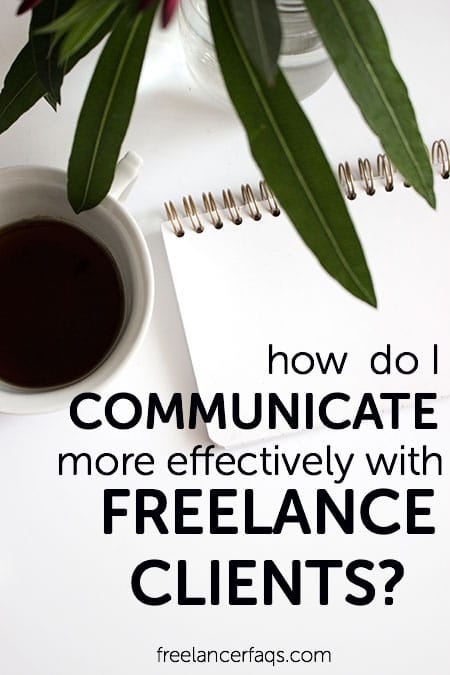As a freelance writer, my work kicks off long before a single word is penned. Long before the computer is booted up and the coffee maker put on red alert.
Every single assignment starts not with the written word, but with communication. Getting the communication bit right is as important as writing well. In fact, there’s no way to write well without communicating well with clients.

Every freelance assignment starts not with the written word, but with communication.
Let’s delve a bit deeper.
For me personally, every single project that has become complicated or gone a little off the rails – taken up too much time, consumed too much headspace, or got stuck in a loop of tinkering and changes – has started with bad communication.
I’d go so far as to say that if my communication with a client is going well, there’s a very high correlation with my overall project succeeding with flying colors.
There is some irony here. Some of us have might be drawn to freelance writing careers because they’re solitary and don’t require constant people interaction.
And then you realize that people interaction is actually one of the most important skills if you’re shaping ideas using words for clients that pay you.
This doesn’t mean that we need to become public speakers or late-night comedy hosts to succeed at our job – though that might actually help.
There are some easy steps we can put on a list to make sure that the communication with our clients goes well, expectations are managed from the get-go, and everyone understands what the project is about.
So, let’s kick off with a few suggestions.
Always Establish Scope
This sounds like management jargon. But really, the scope of the project is a social (and written) contract between you and the client. It sets out what you’ll do, what you expect to be paid as a freelance writer, the time you’ll put in, and what help you’ll need from the client in terms of time and access to resources.
Get the scope wrong, and one party will suffer. Either the client will feel short-changed or you’ll wind up working free hours and doing extra work.
Establishing scope at the outset is the trickiest bit of the project because everyone’s in a hurry to get moving. And this is the step in the project lifecycle where you (and quite possibly, the client) have the least knowledge about how the work’s going to develop.
But it’s definitely worth it to have a few chats with the client, understand what they want, why they want it, and come up with a clear stance on what you’ll do – and what you won’t. And then communicate it not just verbally but also in writing.
Make sure that email is acknowledged, too. Effective client communication starts with establishing boundaries. And sometimes you have to push back.

Speak the Client’s Language
Here’s the thing – writers sometimes have to be mind readers and great interviewers, too. No pressure!
And that’s because your client has a pain point – something they wish was otherwise – something they need your help addressing.
Basically, there is a desirable outcome in their head that is to do with their business. And if we can get to that, we can do a better job of suggesting ideas and the right words.
I always ask clients what they want a project’s final outcome to be. Not just in terms of words written, and deliverables. No, I mean the final outcome that the client wants for their business. Is it, “I want more conversions on my web copy?” Or, “I want compelling text that makes my brand look good?” Or perhaps, “I need my customers to better understand what it is I do?”
Is it, “I want more conversions on my web copy?” Or, “I want compelling text that makes my brand look good?” Or perhaps, “I need my customers to better understand what it is I do?”
Once we get inside the client’s head and start speaking their language, the conversation becomes easier.
Never Have All the Answers
You have your first important client meeting. You walk in there to impress, and spend a lot of time talking. The meeting’s over and you’re given the go ahead to start. And that is the point where you realize that you’re still a bit fuzzy on the client’s perspective. It’s happened to me.
As a professional writer, it’s tempting to have all the answers. But it’s the clients who are experts in their field, and in their business. Our first task is to understand their ideas and help them express them.
For the longest time, my elevator pitch has been, “I help brands communicate effectively through words.” Not “I write words.” But that I take what people want to say and write to make it simple and accessible. It reminds me that what clients want to say is important, and it’s my job to find out.
Authors write bestsellers. But freelance copywriters are tasked with something far less glamorous: helping clients better understand their own ideas, and expressing them effectively. And for that, we need to be good communicators.
Now it’s your turn – tell me what tasks you do to effectively communicate with your client.



4 Comments